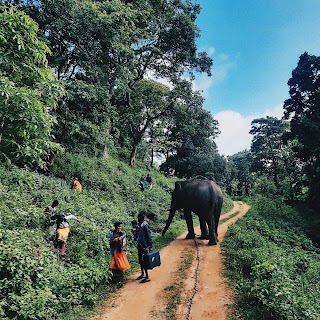Conservation and Philosophy: Exploring the Deepest Roots
Yesterday, the world celebrated World Philosophy Day (or not; who even celebrates philosophy?), and as someone whose life turned around entirely because of the incredible field of inquiry, I find myself wanting to express a few things that have been on my mind lately.
In the past few months I have found myself often explaining to my friends from college how in the world I decided to pursue science (and especially wildlife conservation) after studying philosophy, and to my classmates from my wildlife conservation course what in the world this mysterious subject of philosophy was.
A
significant part of that explanation would be how closely related these
two fields are, and how deeply rooted philosophy is in wildlife
conservation (as with every other field ever, probably).
Conservation
is a science. It depends on scientific methods of wildlife management
and research, "people management", and so on. But what sets it apart
from other fields like say, zoology? What is the hidden but very active
implication of the term "wildlife conservation" that makes it different
from zoology?
I believe
that hidden within the term and the field is a strong, inherent moral commitment that any practitioner or researcher of conservation takes to
protect wildlife and people. This goes much beyond mere scientific
research. We often (but not as often as we must) read about conservation
being inherently political. But also, and more importantly perhaps,
conservation is also inherently (and by definition) philosophical.
Conservation
requires - or must require - every person involved to contemplate on
not only ethical, but even metaphysical roots of the concepts that they
deal with. It is not only important to ask, for example, "How does one
weigh the consequences in a 'people vs wildlife' situation?"; but also,
"What is the meaning of 'weighing consequences', and how do we come upon
the right way to do it?" and "Who and what decides the value of people
and the value of wildlife?"
Would
it be justified to formulate and implement conservation programs in
Dibang Valley, for example, without knowing and studying and exploring
the metaphysical meaning of the forest for the people? Without realising the inherent links between these metaphysical meanings and the ethics and way of life of the people? Would it be justified to label their hunting practices as morally wrong without understanding the stories and myths behind those rituals? In a world that
is filled with philosophical beings, can objective and impersonal
science be enough to manage and mitigate all conflict? I believe not.
Everything
we practise and study and do and believe is philosophical - and
wildlife conservation is no exception to it. Unfortunately, philosophy
in most fields takes a hidden, subconscious position. Most people
studying conservation do deal with the aforementioned and such
questions, but usually without realising that they are engaging in
ethics and philosophy. And what do we thus lose? Where there would have
been a chance to actually apply the theoretical concepts of philosophy -
like utilitarianism, deontology, and consequentialism - and evaluate
every situation as such, there would instead be incomplete evaluations
without an in-depth ethical meta-analysis of the situations.
Philosophy
has so much to contribute, now more than ever before. All science came
from philosophy, and no science ever existed without it - and never will.
In fact, it was philosophy that steered me back to wildlife
conservation with the words of philosophers such as Aldo Leopold and
Arne Næss. And beautifully, conservation too keeps taking me back to
philosophy, with every question, every study, and every conversation.
Here's
to realising that conservation is philosophical. Here's to becoming a
tiny, thinking, working philosopher with each passing day.



Intriguing!
ReplyDeleteWow!! My young philosopher! Well written. .. Proud of you my dear! !
ReplyDelete